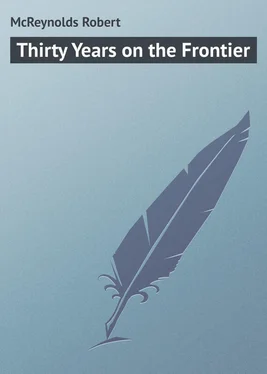Robert McReynolds - Thirty Years on the Frontier
Здесь есть возможность читать онлайн «Robert McReynolds - Thirty Years on the Frontier» — ознакомительный отрывок электронной книги совершенно бесплатно, а после прочтения отрывка купить полную версию. В некоторых случаях можно слушать аудио, скачать через торрент в формате fb2 и присутствует краткое содержание. Жанр: foreign_prose, на английском языке. Описание произведения, (предисловие) а так же отзывы посетителей доступны на портале библиотеки ЛибКат.
- Название:Thirty Years on the Frontier
- Автор:
- Жанр:
- Год:неизвестен
- ISBN:нет данных
- Рейтинг книги:4 / 5. Голосов: 1
-
Избранное:Добавить в избранное
- Отзывы:
-
Ваша оценка:
- 80
- 1
- 2
- 3
- 4
- 5
Thirty Years on the Frontier: краткое содержание, описание и аннотация
Предлагаем к чтению аннотацию, описание, краткое содержание или предисловие (зависит от того, что написал сам автор книги «Thirty Years on the Frontier»). Если вы не нашли необходимую информацию о книге — напишите в комментариях, мы постараемся отыскать её.
Thirty Years on the Frontier — читать онлайн ознакомительный отрывок
Ниже представлен текст книги, разбитый по страницам. Система сохранения места последней прочитанной страницы, позволяет с удобством читать онлайн бесплатно книгу «Thirty Years on the Frontier», без необходимости каждый раз заново искать на чём Вы остановились. Поставьте закладку, и сможете в любой момент перейти на страницу, на которой закончили чтение.
Интервал:
Закладка:
I joined a party who went thirty miles to the northwest in search of new diggings, and the most that came of it was a laughable incident.
The great hills rose on every side, frowning darkly in the dense forest of pine. Our voices echoed from rock to rock, as we sat one noon-day about our camp-fire, talking of possible finds, when, bareheaded, with hair disheveled, blood flowing from a wound in his face, and a wildcat held to his chest in close embrace, Mark Witherspoon rushed into camp, yelling at the top of his voice. He was prospecting in a ravine a mile distant, when he saw something waving in the underbrush. Thinking it was mountain grouse, he advanced in hope of getting a shot, when a huge wildcat sprang at his throat.
As the forepaws of the animal struck his chest, he let fall his gun, and hugged the beast with all his strength to his chest with both arms. The head of the wildcat was drawn slightly backward by the tense pressure of his arms upon its back, while the claws were rendered practically powerless by the close embrace. So quick had been Witherspoon’s action at the start, that he received only a slight wound on the face. In this predicament, he started on a run for the camp. He did not dare to let go and the wildcat wouldn’t, so both held fast. The cat glared up fiercely at him with its yellow eyes, while its hot breath came into his face at every leap. Whenever the vicious beast made the slightest struggle, Witherspoon hugged the tighter, fearing at every step he might stumble and the deadly teeth be fixed in his throat.
In this manner he reached camp, and it was some seconds before he could make us understand that the cat was terribly alive, and that he was not holding it because he wanted to, or racing for the sake of the exercise. Finally one of the men despatched the animal with his revolver, and, to Witherspoon’s inexpressible relief, the dead beast dropped from his arms. Before the boys got through telling the story afterwards, they made it out that Witherspoon had run nine miles with the wildcat.
Soon after our return to Deadwood, a man in an almost fainting condition came into town and announced that his companion had either been killed or captured by the Indians. A party was organized and was led by Wild Bill. It was not long before we came upon a scene that told what the poor fellow’s fate had been, much plainer than words are able to portray. We found his blackened trunk fastened to a tree with rawhide thongs, while all around were evidences of the great torture which had been inflicted ere the fagots had been lighted.
When brought face to face with this, I stowed two cartridges safely away in my vest pocket, resolved to suicide rather than to fall into the hands of such miscreants. Then came the news of the Custer massacre. For many days afterward we patrolled the mountain tops, and kept bivouac fires lighted by night, as signals.
IV
THE CUSTER MASSACRE
The arrival at Fort Lincoln, on the Missouri River, of a party of Indians in 1874, who offered gold dust for sale, was the beginning of the cause that led to the great Sioux war in 1876, in which General Custer and his devoted soldiers were massacred on the Little Big Horn River on the 25th day of June of that year.
The gold which the Indians brought to Fort Lincoln, they said came from the Black Hills, where the gulches abounded with the yellow dust. The consequent rush of white men into that region was, in fact, a violation of the treaty of 1867, when Congress sent out four civilians and three army officers as peace commissioners, who gave to the old Dakota tribes, as the Sioux were then called, the vast area of land bounded on the south by Nebraska, on the east by the Missouri River, on the west by the 104th Meridian, and on the north by the 46th Parallel. They had the absolute pledge of the United States that they should be protected in the peaceable possession of the country set aside for them. This territory was as large as the state of Michigan, and of its interior little or nothing was known except to a few hardy traders and trappers prior to 1874.
With the advent of the gold seekers in 1875 the Indians saw that the greedy encroachments of the white man were but faintly resisted by the United States government, and that sooner or later it meant the total occupation of their country, and their own annihilation, and so with the traditional wrongs of their forefathers ever in mind, they determined to make a stand for their rights.
The scene of General Terry’s campaign against these Indians lay between the Big Horn and Powder Rivers, and extended from the Big Horn Mountains northerly to beyond the Yellowstone River. A region barren and desolate, volcanic, broken and ofttimes almost impassable, jagged and precipitous cliffs, narrow and deep arroyas filled with massive boulders, alkali water for miles, vegetation of cactus and sagebrush – all these represent feebly the country where Custer was to contend against the most powerful, warlike and best armed body of savages on the American continent.
An army in this trackless waste was at that time at the mercy of guides and scouts. The sun rose in the east and shone all day upon a vast expanse of sagebrush and grass and as it set in the west cast its dull rays into a thousand ravines that neither man nor beast could cross; to go north or south could only be decided by personal effort. An insignificant turn to the wrong side of a little knoll or buffalo wallow would ofttimes lead the scout into ravine after ravine, or over bluff after bluff, until at last he would stand on the edge of a yawning canon, hundreds of feet in depth and with perpendicular walls. Nothing was left for him to do but to retrace his steps and find an accessible route.
Custer had been ordered by General Terry to proceed with his command, numbering 28 officers and 747 soldiers, up the Rosebud River, and if the trail of the Indians was not found at a given point, to then follow the course of the Little Big Horn. These instructions were followed, and on the 24th of June he turned westerly toward the Little Big Horn, where a large Indian village was discovered some fifteen miles distant. The trail they were on led down the stream at a point south of the villages. Major Reno with three companies was ordered to follow the trail, cross the stream and charge down its north bank, while Captain F. W. Benteen was sent with three companies to make a detour south of Reno.
The point where the little armies separated, many of their men never to meet again, the river wound its silvery course for miles in the narrow valley as far as the eye could reach; its banks were fringed with the elm and cottonwood, whose foliage hid from view a thousand Indian tepees beyond the river. Sharp eyes had noted the advancing columns, and quick brains had already begun to plan their destruction.
That night the three divisions made a silent bivouac beneath the stars which must have looked down like pitying eyes.
In the grey light of the morning, and with noiseless call to boots and saddles, they were stealing on toward the foe.
Reno proceeded to the river and crossed it, charged down its west banks and met with little resistance at first. Soon, however, he was attacked by such numbers that he was obliged to dismount his men, shelter his horses in a strip of woods and fight on foot. Finally, finding he would soon be surrounded, he again mounted his men, charged the enemy and recrossing the river, took a naturally fortified position on the top of a bluff.
Benteen, returning from his detour, discovered his position and drove away the Indians and joined him. Soon the mule train was also within his lines, making seven companies under his command.
Reno engaged the Indians soon after noon on the 25th and did some hard fighting until the evening of the 26th, when the enemy withdrew. After congratulations with their reinforcements the question uppermost in every mind was: “Where is Custer?”
Читать дальшеИнтервал:
Закладка:
Похожие книги на «Thirty Years on the Frontier»
Представляем Вашему вниманию похожие книги на «Thirty Years on the Frontier» списком для выбора. Мы отобрали схожую по названию и смыслу литературу в надежде предоставить читателям больше вариантов отыскать новые, интересные, ещё непрочитанные произведения.
Обсуждение, отзывы о книге «Thirty Years on the Frontier» и просто собственные мнения читателей. Оставьте ваши комментарии, напишите, что Вы думаете о произведении, его смысле или главных героях. Укажите что конкретно понравилось, а что нет, и почему Вы так считаете.












